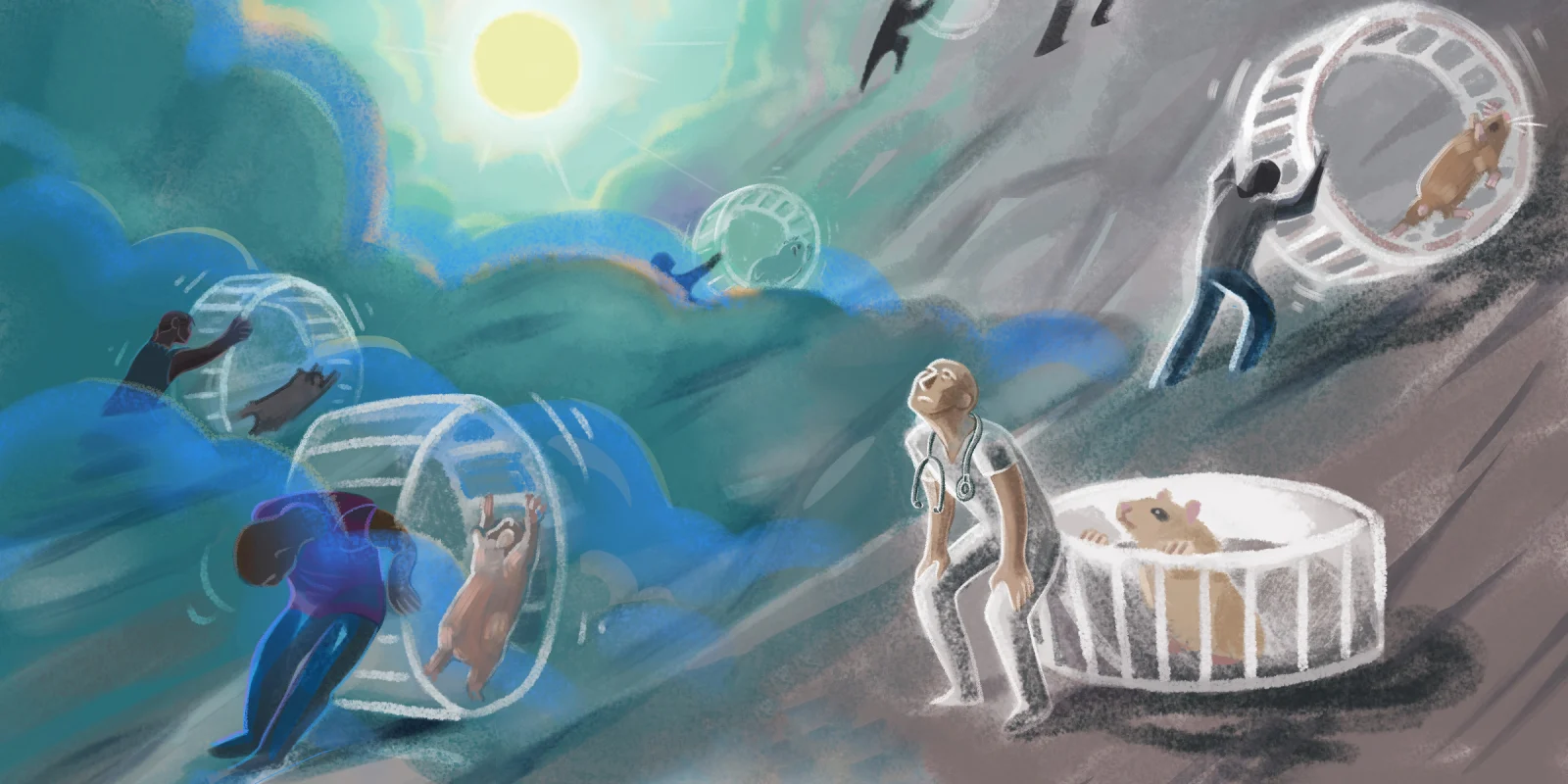I couldn’t believe the email when I opened it — I had gotten into my first choice program. I was elated. I had interviewed around the country, spoken to numerous people, and found a place that felt like home. I had gone with my gut. I was excited, proud, passionate. I called my parents, my husband, my friends, and shouted from the rooftops that not only had I matched, but I was exactly where I wanted to be.
It was only six months later that I was crying in the shower and asking my husband on a daily basis if I should quit. I found myself at a training institution where the ground beneath me was crumbling, and I was acutely aware of how trapped I felt. And, I felt even more like a failure because I had actively taken part in the creation of this destiny for myself. I had been fooled, and now I was imprisoned. While I had my family and friends, I felt acutely alone and constantly disappointed. I reached out to friends and colleagues asking what to do — do I quit? Do I stay? I spent weeks looking for advice about how quitting isn’t really quitting if it’s for your own health. Everywhere I looked made it seem like I had to be bordering on suicidal in order to quit; otherwise, the wisdom went, trudge through “like the rest of us” (which seemed to be the motto in medicine).
I was aghast at how many people told me to stick it out, make the best of things, focus on other things in my life. It seemed everyone in medicine was a believer in the sunken cost fallacy — that if you’ve already dedicated time and energy, it’s not worth veering off the known path. I couldn’t accept this advice as I felt that my training was taking up a great deal of my energy, making it difficult to focus on my well-being. A friend of mine sent me a survey meant to assess my burnout index. It always returned in the severe range, with a suicide hotline number at the bottom. While I wouldn’t say I was actively suicidal, I certainly thought often about quitting medicine and undervalued myself frequently. My situation felt tied to my own personal faults because I was, after all, the architect of my own unhappiness. There was no one else to blame but myself (in retrospect, it was an unfair analysis but it was also so much easier to self-blame).
While I had a supportive partner, friends, and a family, I felt alone, primarily because I didn’t know the right answer. In medicine, “quitting” is ingrained in you as synonymous with “defeat,” a failure of your ability to “work through it” or “tough it out.” The problem was that I wasn’t happy, period. I wondered if sacrificing my happiness for several years would allow me greater happiness in the future — or if cutting my losses and finding a new position would produce better results. Was I unhappy because I was just an unhappy person? Or was I unhappy because I was comparing myself to my friends, who seemed happier in their respective careers? Was I just getting older and life was becoming more complicated with children and life choices?
I don’t have all the answers for every scenario. But I can tell you what I did and what I’ve learned from it. After evaluating my situation, I realized that much of my unhappiness was tied to very specific details related to my job. Because I was afraid of confiding in colleagues, afraid to find that their allegiances were to my program rather than to me, and, worst of all, that whatever I said or did would make my situation worse, I sought advice from mentors outside of my normal circle. I found that by speaking to an experienced mentor who could address my questions directly and talk with me about my options — regarding transferring to a different institution, the consequences of quitting, etc. — I could make an informed decision. Ultimately, my decision isn’t right for everyone, but I think the process may be applicable to many.
Here is what I learned from this process:
Don’t Let the Bastards Get You Down
While this refrain seems kitsch, it's so much more than that. Whether you’re in private practice, academia, residency, fellowship, medical school, or elsewhere, there will always be something or someone or some system that impedes you. In the midst of my struggle, I worried constantly that perhaps I lacked grit. I kept hearing about physicians in days past who worked endless days and weeks without breaks, without support, without teachers. The thing is: it doesn’t matter how many miles someone else had to walk uphill in the snow — this isn’t their life or their path, it’s yours. Just because they did doesn’t mean you should. You are the writer of your story, and I, for one, didn’t want to be the scorned, empty person telling tales of abuse as a badge of honor. There is no honor in that story for me. I much prefer to be happy. Don’t let the bastards get you down.
You Come First
I didn’t really understand before why people experience burnout in medicine, especially academic medicine, until I experienced it for myself. You begin to see yourself as a cog in a system, and the things that excited you about medicine slowly begin to dwindle in comparison to the pay, hours, charting, expectations. Everything pales in comparison to feeling undervalued and underappreciated. I think the key is deciding whether quitting is the best way to get you what you want. Obviously, if your own life is at risk, it’s time to quit, whether that be for the short-term or forever. A mental health break is exceedingly common because medicine is exceedingly difficult. If you need a break, don’t question taking one, even if it means paying it back later. I spent far too long questioning whether to take a break when I really needed it to gain perspective and clarity.
Make a Plan
This is what I struggled with the most. Sure, I was unhappy. Yes, I had friends and mentors who were giving me advice. But the actual decision-making part was difficult. Do I quit and pursue a different career? Do I try to transfer? Do I stick it out? Do I find a way to make the status quo palatable? Do I meet with someone, tell them my grievances? I tried every single one of these options. I began to look for other work in case I needed to leave. I studied the system I was in, in order to find trusted avenues for advocacy on my behalf. And finally, when the ground beneath my feet was crumbling, I reached out and looked for a transfer option.
All options have endpoints that, in the moment, suck. Let me delineate all the points I played out in my head:
I don’t want to quit and find a job because what if I can’t find a job?
I don’t want to move my family.
I don’t think reaching out for a transfer will work because there won’t be any spots, or if they’re there, they won’t be any good — why are they open to begin with?
How do I know that once I transfer, it won’t be a completely new mess, at which point I’ll be so demoralized, I’ll have to make it work.
If I stick it out, how do I know that it will be worth it?
This hamster wheel was the one I ran on for months and months. Ultimately, you have to just decide what you can and cannot live with. For me, I fought as hard as I could, demanded better for myself, used subtlety as well as not-so-quiet requests to advocate, and finally chose the best option I had before me.
Find a Few Trusted Mentors and Friends, and Discuss the Plan, Then Execute
Before deciding on my course of action, I asked the opinions of people I trusted. Limit the number to five. Any more than that and you’ll be overwhelmed by insight. Listen to your own thoughts even while you’re asking for feedback. Ultimately, your own insight is what should guide you. Take a deep breath, let your advocates know what you’re thinking about doing, and that you’ll need support when it's done. Then, execute. While you should take a pregnant pause to consider your actions, don’t wait so long that you idle indefinitely. This is your life, your happiness, your future. Make a choice, stick with it, and ask your circle for support. The actual answer isn’t that there is a single “right” answer but that there are many “right” options; the question is which one you want to take. You’ll make it out, perhaps not entirely unscathed, but you’ll eventually be on the other side, able to look back and say, “That sucked. But I made it through. I navigated it. I survived that hurdle, and I’m still here.”
You Are So Much More Than the Medicine You Practice
My best friend, while I was engulfed in the flames of my personal training hell, was feeling the same way at her training institution. When she spoke to me, she kept reiterating that she felt like a lunatic, like she wasn’t doing enough, or wasn’t smart enough, or wasn’t working hard enough. She would chart into the wee hours of the night and wake up early to start anew. She felt like an outcast. Instead of telling her to work even harder to convince others that she belonged, I urged her to work a little less and to Facetime her fiance for longer. In my own life, I’d write slightly worse notes so I could get home early. I’d find myself bypassing research articles I knew I needed to read to hold my son and teach him T-ball and chase him in the yard. I knew that I’d eventually be asked whether I had read the requisite material and would be found guilty of not knowing something, but the joy gained from spending those moments with my son were greater than any punishment I could receive. It’s hard for me to tell you where to draw the line between cutting corners and hurting people, between doing a good job and making concessions that allow you to be human. All I can say is, try to identify how you can maintain your humanity even in an untenable situation.
Have you ever felt like the architect of your own unhappiness? What did you do? Share in the comments.
Dr. Muldoon is a minimally invasive gynecologic surgery fellow, a mother to the world’s tallest one year old and a 7-year-old Labrador, a wife to a kind Canadian, and an avid reader and fridge magnet collector. Dr. Muldoon is a 2020–2021 Doximity Op-Med Fellow.
Illustration by April Brust






